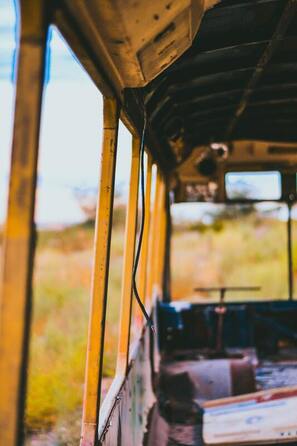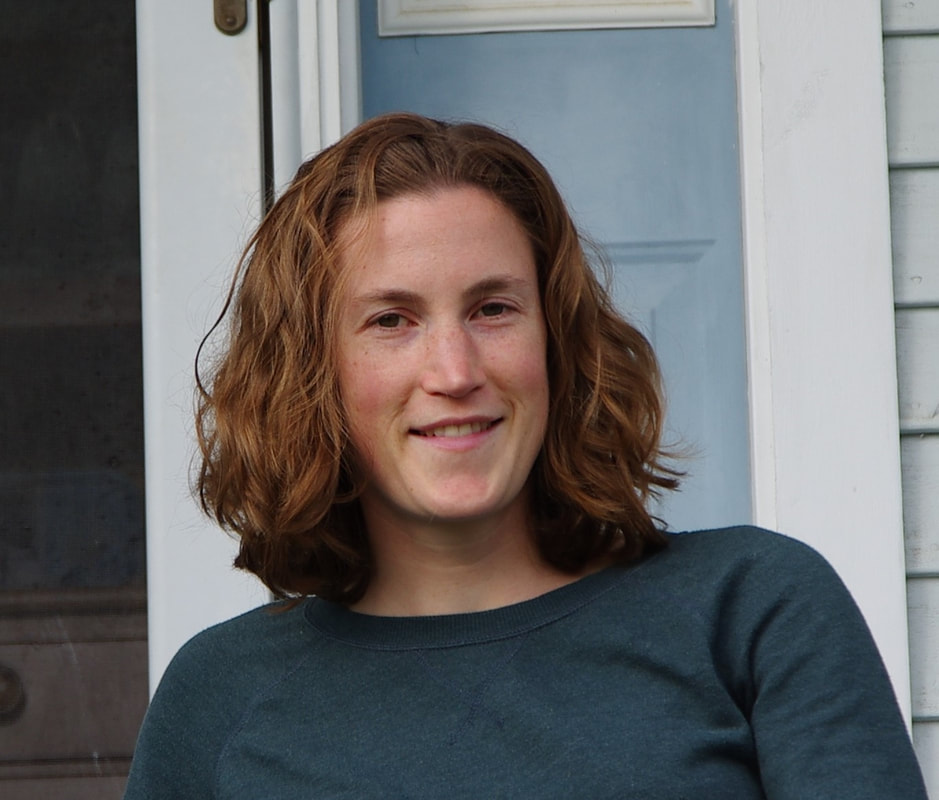 When I was five or six, my parents often deposited me with my grandfather for the morning while they did whatever grown-ups needed to do. My parents and I walked into his house through the jittering and squeaking door that needed a gentle, practiced joust to dislodge it from its swollen frame and found him sitting in his blue armchair next to his jar of pink candies. One of our understood activities was visiting the buses. But first, I pointed at a sugar-covered, chocolate cake donut in the enormous blue glass jar that lay just out of reach on the counter. My grandfather ceremoniously extracted one, cut it delicately with a butter knife, and served it to me on a plate. Donuts were strictly forbidden (or at least viewed with trepidation and disdain) at my house. The breaking of the donut was an act of rebellious solidarity. Replete, we exited the house through the garage and continued across the driveway, the asphalt cracks packed with caterpillar-like birch catkins. From our hilltop vantage point on Ellis Avenue, we could just view Main Street and catch the faint rush of passing cars below. An imposing grass cliff topped with stately gravestone pillars rose behind Main Street. As we descended each swell of the hill, my grandfather pointed out the houses, “That’s where Hardy Hubbard lives. Here is Virginia, she gave you that handkerchief once.” I nodded resolutely, not wanting to disappoint him that I did not have the slightest memory of these figures. At last, we turned into the gravel driveway of the abandoned repair shop and gas station. Rows of silhouetted orange-amber glass bottles guarded the windows of the shop. They always glowed eerily, whether sunny or cloudy, convincing me there was some light within, undoubtedly ghostly, that gave them their inextinguishable power. Passing the bottles and turning the corner, we emerged into the yard of buses, most of them traditional and yellow, some of them pug-nosed, some of them dolichocephalic, all of them retired for unknown and uncounted years. The buses were surrounded by rivulets of gravel as rain wash flowed around their wheels and grass grew underneath them. I climbed the stairs through the open front doors, sat in the driver's seats, grasped the towering, immobile steering wheels, squinted in the cracked rearview mirrors, jumped over the rows of seats, clicked the seat belts, opened and closed the doors that were not rusted in place. I darted about, at once the admonishing bus driver, the criminal backseat sitter, the impatient stop waiter. But in the end, I always felt melancholy about the buses. I needed to see all of them so none would feel unvisited, none would yearn for the cudgeling from a child’s foot. As I grasped my grandfather’s hand and we headed back towards the street, I looked up at him and knew with a deep longing that one day too the grass would grow around him, his glasses would become cracked, and his limbs stuck in one orientation. Now, I imagine the bygone buses in their heyday, flowing with oil and roaring diesel, and I still walk with my grandfather. I still hear the reassuring timbre of his voice, watch the corners of his lips draw up in joy, and feel his solid presence full of movement that seemed like it would always be there.
0 Comments
Leave a Reply. |
FLASH GLASS: A MONTHLY PUBLICATION OF FLASH FICTION, PROSE POETRY, & MICRO ESSAYSCOVER IMAGE:
|
|
Glassworks is a publication of Rowan University's Master of Arts in Writing 260 Victoria Street • Glassboro, New Jersey 08028 [email protected] |
All Content on this Site (c) 2024 Glassworks
|



 RSS Feed
RSS Feed
